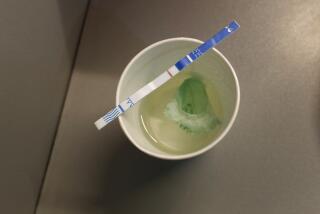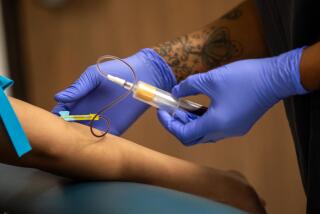Private AIDS-Testing Clinics Draw Criticism for ID Cards, Lapel Pins
Its promoters call it an alternative to public testing for AIDS.
At two attractively furnished clinics in Tustin and Westminster, clients of The Assurance Society 1 pay $85 to have their blood drawn and hear a 10-minute videotaped message on how to avoid contracting the deadly AIDS virus.
The service is confidential. The results are available in three days compared to a two-week turnaround at Orange Countyâs free, public AIDS-testing clinic.
And for those who test negative for the acquired immune deficiency syndrome virus, there is one more bonus the public clinic doesnât provide: The Assurance Society 1 offers a photo identification card and a gold-and-blue lapel pin that says âIâm at Ease.â
Activists, Officials Criticize Service
But the new service--the latest among about 20 private test sites in California seeking to turn a profit from the AIDS epidemic--has drawn criticism from local AIDS activists and from some county and state health officials. They argue that counseling by videotape is no substitute for personal counseling about this fatal disease. And they claim the Assurance Societyâs lapel pin and ID card are misleading.
âI think itâs false âassurance,â to use their words,â said Tim Miller, project manager of the AIDS Response Project in Garden Grove, a private agency that counsels AIDS victims.
Miller and Dr. Rick Greenwood, acting director of Orange Countyâs Sexually Transmitted Disease clinic, the county facility for AIDS testing, noted that someone who tested negative could be exposed to the AIDS virus the day after a negative blood test and so still carry the virus.
Others took a dim view of the counseling by videotape.
âYou canât get feedback from a TV screen,â said Parrie Graham, executive director of the Aids Services Foundation of Orange County. âYou need that human contact--even reassuring them that they arenât going to go to hell for that one sexual contact.â
The AIDS virus, which is transmitted through sexual contact, virus-infected blood transfusions or the sharing of contaminated intravenous needles, attacks the bodyâs immune system and leaves victims vulnerable to fatal illnesses.
By the end of July, some 39,000 Americans had been diagnosed with AIDS and 22,548 had died. Another 1 million to 2 million Americans are estimated to carry the virus but have not developed symptoms of the illness.
Other private test sites that have offered cards suggesting the bearer is free of AIDs have also come in for criticism.
In San Diego last April, county health officials called one businessmanâs plans to offer a âcard of lifeâ with each negative AIDS test misleading. And in January, 1986, the Los Angeles City Council ordered an investigation into a group called the National Assn. for AIDs Awareness which planned to offer identification cards to those testing negative. The promotion never got off the ground, however, because city officials found building code violations at the companyâs West Los Angeles office and ordered it closed.
The Orange County entrepreneurs appear to be operating legally, state and local health officials said. But Stan Hadden, chairman of the California Aids Advisory Committee, which advises the state health department on AIDS, said he was âvery disturbedâ about the Assurance Societyâs lapel pin offer. âIt does give people a sense of false security,â Hadden said. âIf you just go in and get tested and use a negative test to go on continuing a high risk behavior, itâs not doing any good.â
Testing âWindowâ
AIDS experts like Hadden also noted that there is âa windowâ in testing for AIDS--a period of from two weeks to six months when a person could be carrying the virus but not yet have developed AIDS antibodies, and so might still test negative for AIDS.
The Assurance Societyâs medical director, Dr. Russell M. Morgan, mentions that âwindowâ in his videotaped counseling, but the service gives out its âIâm at Easeâ pin anyway.
Neither the pin nor the ID card should be construed as a guarantee that a person is free of the AIDS virus, said Morgan, who also works as a family physician in Garden Grove. âIt is only an indication that a person went and had a blood test,â he said.
Morgan called the lapel pin âthe most minor thing in our entire program.â
Assurance Society President Christy Walsh agreed. âNo, it is not a guarantee,â said Walsh, an Irvine advertising executive who, with shopping center developer Dean Davison, nine other investors and $100,000, started the societyâs two AIDS-testing clinics in mid-July.
âIt (the pin) just shows that you are concerned and other people should be concerned because this has the makings of a Black Plague, if you will,â Walsh said.
Recent newspaper ads for the Assurance Society donât mention the card or lapel pin, but the societyâs first ad on July 12 stressed: âA confirmed negative lab test and you will proudly wear this pin and carry this card . . . tell the world âIâm at ease.â . . . Watch for the pin--be assured.â
Although Morgan now downplays the pin, in one interview he likened wearing it to wearing a Rotary Club button.
And in an article Morgan prepared for the society, the white-haired physician declared: âGet tested for AIDS and be proud to carry a card and wear a lapel pin stating when you were tested for AIDS and that you were negative. And, being negative, you expect that people you come in contact with will have a card and pin to show the same.â
Morgan also defended his counseling, adding that he will personally counsel anyone who wants additional information and will break the news to every client who tests positive for AIDS. (So far, in three weeks of operation, all of the Assurance Societyâs 200 clients have tested negative for the virus.) Meanwhile, all clients who test negative are given a fat packet of information on AIDS and each is supposed to sit through the 10-minute videotaped lecture by Dr. Morgan on AIDS.
Explains Test
âHello there, Iâd like to personally welcome you to the Assurance Society,â a somber-looking Morgan says on the videotape. The doctor then briefly outlines sexual behavior that should be avoided, explains the test for the AIDS virus and encourages clients who are ânot in a 100% monogamous relationshipâ to return for a $65 retest in three months.
At societyâs small office in the Tustin, the ambiance is that of a modern medical office. There are pastel-colored chairs, modern prints on the wall, a stack of popular magazines to peruse and, in an oak cabinet against one wall, a video monitor.
Several people who stopped by that clinic one morning last week glanced at Dr. Morganâs videotape, had their blood drawn and left without listening to the full 10-minute lecture on AIDS.
âI donât know much about the situation. Iâd like to talk to someone,â said a 29-year-old South Laguna resident who identified himself only as Todd as he paid $85 in cash for his test.
In response, clinic aide Don Berk snapped on the videotape. Todd watched a moment, leafed through the packet of material on AIDS, then walked nervously into a small back room to have his blood drawn.
Todd said he had received what he wanted--a speedy, anonymous test. âIt was quick and painless,â he said.
Todd said he wasnât interested in using the ID card. But another client, Jeff Hobart, 23, of Orange said he would like it: âAll I want to do is give it to my girlfriend and say âIâve taken care of this problem.â â Hobart said.
Although blood is drawn at the societyâs offices, the firm doesnât perform any tests itself. Rather the business contracts with a large laboratory, the Central Diagnostic Laboratory in Tarzana, to supply two technicians to draw blood at its two clinics.
Samples are sent by courier to the Tarzana lab where they are analyzed using the Elisa test, a common test for the AIDS virus. If that test is positive, the Tarzana lab performs a second and more expensive test called the Western Blot to confirm the diagnosis.
Both Walsh and Morgan said they believe they are performing a public service by supplying a private alternative to the countyâs free AIDS testing. But AIDS Services Foundationâs Graham said: âWe will continue to recommend to the countyâs alternative testing site. We know the test will be done in confidence, will be done correctly and itâs free; thereâs no profit motive there.â
More to Read
Sign up for Essential California
The most important California stories and recommendations in your inbox every morning.
You may occasionally receive promotional content from the Los Angeles Times.










